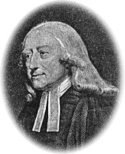Adam Clarke

Adam Clarke (b. 1760–1762, d. August 28, 1832[1]) was a British Methodist theologian and biblical scholar. He was born in the townland of Moybeg Kirley near Tobermore in Northern Ireland.[2]
NB: Adam Clarke The Newspaper Bell's Weekly Messenger of Sunday 2 September 1832 gives his date of birth as 1763 & his death as “at a quarter past eleven o’clock on Sunday night” (Sunday 26th Aug. 1832). Cause of death was cholera, he died in Mrs Hobbs house at Bayswater, Westminster, London.
Commentary
He is chiefly remembered for writing a commentary on the Bible which took him 40 years to complete and which was a primary Methodist theological resource for two centuries.
That commentary, published as: "The New Testament of our Lord and Saviour Jesus Christ. The text carefully printed from the most correct copies of the present Authorized Version. Including the marginal readings and parallel texts. With a Commentary and Critical Notes. Designed as a help to a better understanding of the sacred writings. By Adam Clarke, LL.D. F.S.A. M.R.I.A. With a complete alphabetical index. Royal Octavo Stereotype Edition." [In six volumes of approximately 1,000 pages each] "New York, Published by J. Emory and B. Waugh, for the Methodist Episcopal Church, at the conference office, 13 Crosby-Street. J. Collord, Printer. 1831.", may be the most comprehensive commentary on the Bible ever prepared by one man. By himself he produced nearly half as much material as the scores of scholars who collaborated on the twelve-volume The Interpreters’ Bible.
His commentary, particularly that on Revelation, identified the Catholic Church with the Antichrist.
Clarke followed Wesley in opposing a Calvinistic scheme of salvation, preferring instead the Wesleyan-Arminian positions regarding predestination, prevenient grace, the offer of justification to all persons, the possibility of entire sanctification, and assurance of salvation.
"Behold therefore the goodness and severity of God: on them which fell, severity; but toward thee, goodness, if thou continue in his goodness: otherwise thou also shalt be cut off."
Theological views
As a theologian, Clarke reinforced the teachings of Methodist founder John Wesley. He taught that the Bible provides a complete interpretation of God's nature and will. He considered Scripture itself a miracle of God's grace that "takes away the veil of darkness and ignorance."[3] With such an understanding, Clarke was first and foremost a biblical theologian, often uneasy with purely systematic approaches to theology.
Perhaps his most controversial position regarded the eternal Sonship of Jesus. Clarke did not believe it biblically faithful to affirm this doctrine, maintaining that prior to the Incarnation, Jesus was "unoriginated". Otherwise, according to Clarke, he would be subordinate to God and therefore not fully divine. This was important to Clarke because he felt that Jesus' divinity was crucial to understanding the atonement.
Clarke's view was opposed by many Methodists, notably Richard Watson. Watson and his allies argued that Clarke's position jeopardized the integrity of the doctrine of the Trinity. Clarke's christological view was rejected in large part by Methodist theologians in favour of the traditional perspective.
He joined with other ministers in being an early critic of slavery. In his commentary of Isaiah 58:6, he writes "Let the oppressed go free - How can any nation pretend to fast or worship God at all, or dare to profess that they believe in the existence of such a Being, while they carry on the slave trade, and traffic in the souls, blood, and bodies, of men! O ye most flagitious of knaves, and worst of hypocrites, cast off at once the mask of religion; and deepen not your endless perdition by professing the faith of our Lord Jesus Christ, while ye continue in this traffic!" [4]
Honours and memberships
Elected a member of the American Antiquarian Society in 1816.[5]
Notes
- ↑ "Adam Clarke"
- ↑ Lewis Topographical Dictionary of Ireland (1837)
- ↑ Adam Clarke quoted in Thomas Langford, Practical Divinity: Theology in the Wesleyan Tradition (Nashville: Abingdon, 1983), p. 56.
- ↑ http://sacred-texts.com/bib/cmt/clarke/isa058.htm
- ↑ American Antiquarian Society Members Directory
Resources
- The Christian Prophet and His Work by Adam Clarke (ISBN 0-88019-406-5)
- Christian Theology by Adam Clarke (ISBN 0-88019-261-5)
- Commentary on the Bible by Adam Clarke (ISBN 0-529-10634-5)
- Practical Divinity: Theology in the Wesleyan Tradition (1983) by Thomas Langford (ISBN 0-687-07382-0)
- Adam Clarke, Controversialist: Wesleyanism and the Historic Faith (1975) by Ian Sellers (ISBN 0-900798-08-4)
- When Adam Clarke Preached, People Listened: Studies in the Message and Method of Adam Clarke's Preaching (1981) by Wesley Tracy (ISBN 0-8341-0714-7)
External links
| Wikisource has the text of the 1911 Encyclopædia Britannica article Clarke, Adam. |
- Sellers, Ian. "Clarke, Adam". Oxford Dictionary of National Biography (online ed.). Oxford University Press. doi:10.1093/ref:odnb/5483. (Subscription or UK public library membership required.)
- Some of Clarke's writings - The Life of Adam Clarke, Entire Sanctification, and Adam Clarke's Bible Commentary
- Adam Clarke's O.T. & N.T. Commentary
- Adam Clarke Bible Commentary - Android App
- "Archival material relating to Adam Clarke". UK National Archives.
